© 2017 All Rights Reserved. Do not distribute or repurpose this work without written permission from the copyright holder(s).
Printed from https://www.damninteresting.com/the-reconstruction-of-ulysses-s-grant/
In the second half of the 19th century, few Americans were better known—and revered—than the man whose face looks out today from the $50 bill. Ulysses S. Grant led Union troops to victory in the American Civil War, then thwarted attempts by President Andrew Johnson to suppress fundamental civil rights of newly freed black Americans. Twice elected president himself, Grant stewarded a war-torn nation as it struggled to reunify. After leaving the White House, he invested his name and entire life savings to a Wall Street brokerage firm. It would make him rich, he was told, and afford him a comfortable retirement. Instead, it would leave him penniless.
Like any army commander, Grant had lost battles and had known the pain of defeat. But this loss hit personally. Never before had he found himself in straits so dire, literally destitute. Fortunately, the former president and retired general had one more fight in him—because his real troubles had just begun.
Hiram Ulysses Grant was born in 1822 to Ohio tannery foreman Jesse Grant and his wife, Hannah. In 1839, Jesse secured a place for his son at West Point, not so much for its esteem as a military academy, but because it was free. On his first day there, the young man found his name listed by mistake as Ulysses Simpson Grant. He had always disliked his given initials—H.U.G.—so he came to rather like his new name with its patriotic abbreviation: U.S. Grant.
In 1843, at the age of 21, Grant began his career as a commissioned officer in Missouri, where he fell in love with his roommate’s sister, Julia Dent. They paused their courtship when Grant was sent to fight in the Mexican-American War, in which the U.S. took by force much of the current southwestern U.S. from its neighbor to the south. Personally, Grant felt opposed to what he saw as an unjustified use of superior military force, but he kept his political views to himself. He served dutifully as a junior officer and admired the qualities of General Zachary Taylor, which would shape his own leadership style in a much more significant war two decades hence.
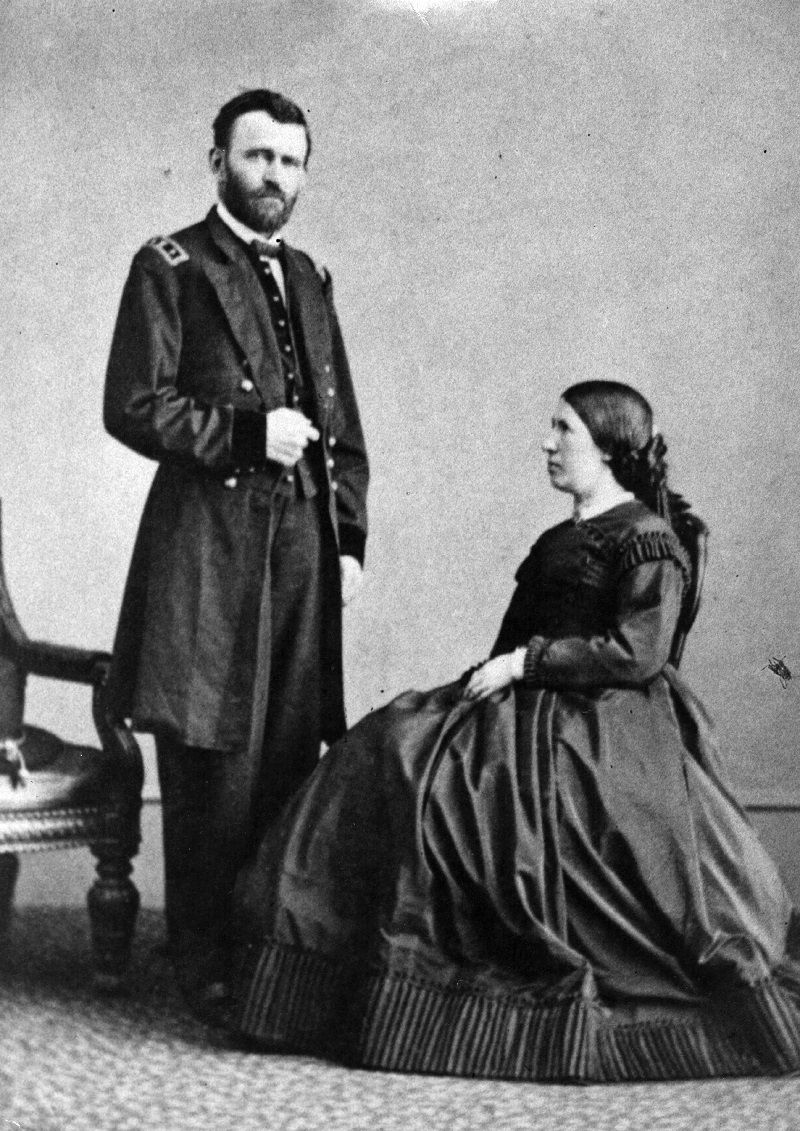
Ulysses and Julia married just months following the end of the Mexican-American war in 1848, a joyous occasion for all but Grant’s parents. Staunch abolitionists, they liked Julia enough, but could not stomach her father, a slave owner and staunch defender of his right to be one. Grant’s parents boycotted the wedding.
Still, the couple’s mutual affection had not wilted in the five years they waited to wed, nor would it ever. To him, she would forever be “dear Julia”, and to her, privately, he was always “Ulys”. However, she would soon discover one small problem: her husband had a remarkable inability to earn a civilian living.
Like many of his peers in the Army, Grant took to moonlighting to bolster his meager military pay. But he failed at everything, in part from trusting everyone he met. He put his money into a venture to sell ice shipped in from the Arctic; it melted en route. Potatoes and onions, planted in anticipation of a certain windfall, rotted in the ground. His partnership in an establishment selling goods to soldiers, known as a sutler’s store, ended when he naively accepted a worthless IOU when his partner wanted out.
Grant began imbibing more than he should, which for him meant just two drinks. That’s all it took to intoxicate the young man to the point of insensibility. He usually resisted having a drink before reporting for duty, but not always. One day, his commander gave the drunken officer an ultimatum: resign or be kicked out. Grant chose to resign.
Broke, the Grants and their two infant children took up residence in a shack in Missouri. He peddled firewood on the streets of St. Louis to support his family, which soon included two more children. He pawned his gold watch to buy Christmas presents. When Julia Grant’s father died, they moved into the Dent family home. They also inherited something else—or rather someone else: a slave named William Jones.
Grant could have ended his financial woes by selling the man for a thousand dollars, or earned even more by renting him out. Instead, he took Jones to the local courthouse and signed manumission papers, setting him free. And then Grant went back to peddling firewood. He would later demur when asked why he did such a thing. Perhaps he was simply his father’s son.
At the outbreak of the Civil War, Grant wanted back in the Army, but the Army wasn’t interested. His reputation as a drunkard preceded him. Eventually they did offer him a unit to lead, one nobody else wanted. The 21st Illinois Artillery was one of the rowdiest, least disciplined, and most troubled units in the Union Army. When Grant took command on 14 June 1861, the restless men were only two weeks from the end of their enlistment. They couldn’t wait to go home. Then they met Grant. At the end of June, nearly every man signed up for another three years. “We knew we had the best commander and the best regiment in the State,” remarked one of them.
Grant turned the unit around by demonstrating a leadership style borrowed from Zachary Taylor in the Mexican-American War, marked by thoughtfulness, decisiveness, simple orders, and—above all—humility. This, his soldiers admired most of all. Grant shunned ostentation, flamboyance, and even a commander’s uniform. He dressed like his men did and looked “plain as an old shoe,” according to one Army doctor.
Grant paid keen attention to detail and remembered everything. He was unafraid of taking risks, learned from his mistakes, and seemed to never tire. And he kept his drinking in check. Instead, he mostly took comfort from cigars. He knew not to be seen drinking, but nobody cared how much he smoked.

Ulysses S. Grant the failure became Ulysses S. Grant the towering general, regarded to this day as one of the best military leaders of all time. In addition to military prowess, he also became known for making the most of whatever he had. This caught the eye of President Abraham Lincoln, who had grown dismayed with one general after another—Winfield Scott, George McClellan, Henry Halleck—complaining they did not have enough troops, or supplies, or time. Grant just did his job.
Waging war was no easier for Grant than his predecessors, and more than once, it appeared the Confederacy might win the war. But Grant kept his wits about him; he’d listen carefully to every word of advice he was given, then quickly make up his mind and pen an order. He communicated more easily in writing than in speaking, and thus would write long into the night. But he always saved energy for a letter to his Julia. “I have been writing until my fingers are tired and therefore you must excuse haste and a bad pen,” he’d write. “Kiss the children for me. Ulys.”
Thus it was Grant whose smarts and stamina—and hard-won victories at places like Shiloh, Vicksburg, and Richmond—landed him across the desk from General Robert E. Lee at Appomattox Courthouse in April 1865, accepting the Confederacy’s surrender and bringing the Civil War to a close. For Grant and the nation, the feeling of relief, and hope for the future, was beyond description. But it would not last long.
Abraham Lincoln thought the world of Grant. The feeling was mutual. Their wives, however, had mutual feelings of another sort. They did not get along. At times, Grant had to choose between his wife and the president, as when Lincoln invited the Grants out for an evening of leisure just days after Lee’s surrender. Grant’s wife would have none of it. So he manufactured an excuse about having to catch the next train north to visit their son. President and Mrs. Lincoln went out that evening without the Grants, taking a short carriage ride from the White House to Ford’s Theater to watch a play. There, John Wilkes Booth entered their box and assassinated Lincoln.
Grant would never forgive himself for begging off, certain that had he accepted the invitation, his bodyguards stationed outside the door would have stopped Booth. As lieutenant general of the U.S. Army he was entitled to armed protection around the clock. The president in those days was not.
Lincoln’s assassination came just five days after Lee’s surrender. Confederate sympathizers seized the opportunity to roll back many of Lincoln’s efforts to reunite the nation. Unfortunately, one of those sympathizers was his own vice president. Andrew Johnson had once been a senator from Tennessee, and Lincoln did not select him for his vice presidential running mate. He had left that to delegates to the 1864 Republican Convention, who put Johnson on the ticket in an effort to attract war-supporting Democrats. Now, unexpectedly occupying one of the most powerful offices on earth, the new commander in chief set out to influence the post-war national rebuilding effort known as Reconstruction. His top priority? Maintenance of white supremacy.
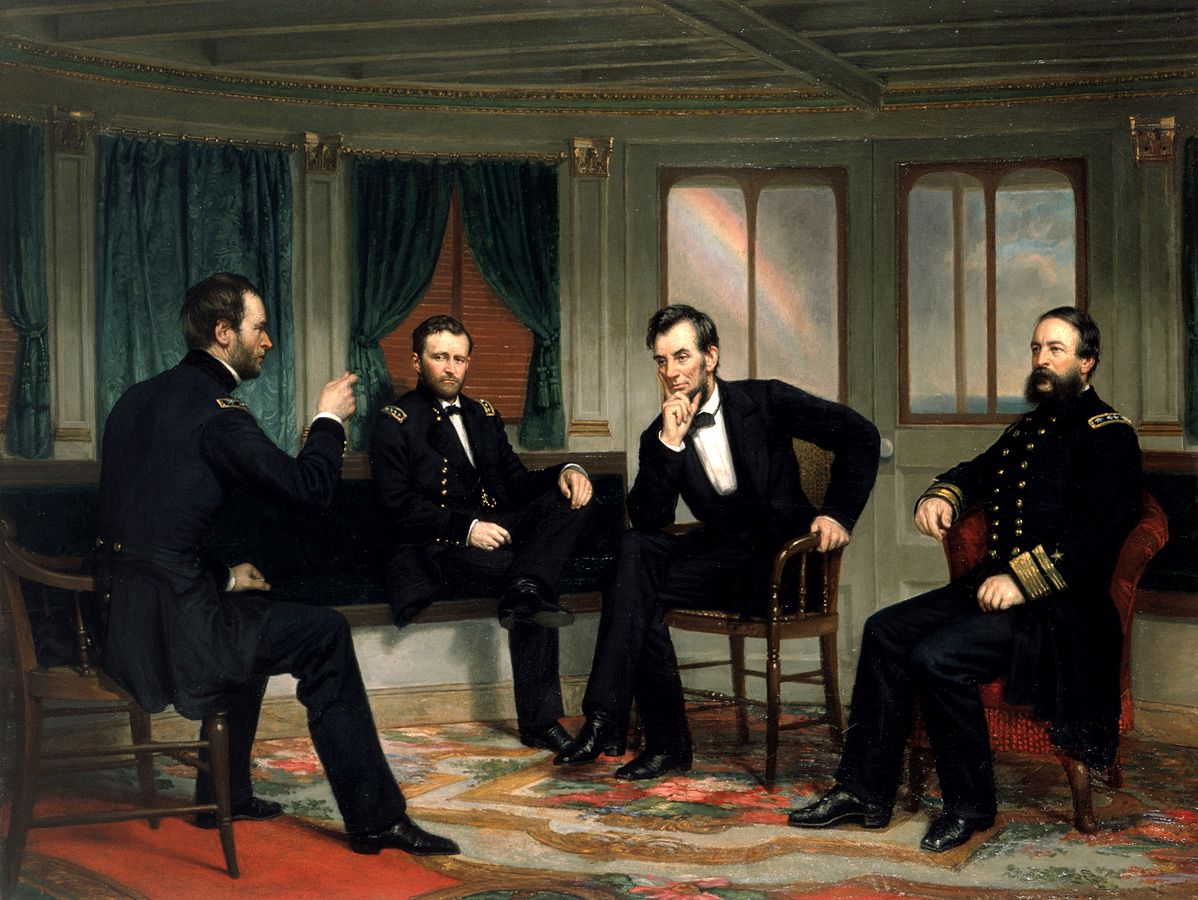
Grant continued serving as Johnson’s general in chief and, later, secretary of war. He found himself walking a fine line, on one hand obliged to obey orders, but on the other dismayed by Johnson’s disregard for the rights of newly emancipated slaves, or ‘freedmen’. Johnson derided the Fourteenth Amendment, refused to enforce measures of Congressional Reconstruction Acts, and fired General Philip Sheridan for seeing to the registration of thousands of black voters.
Congress fought back. Its members united in using every means at their disposal to protect the nation from a man they saw as an utter threat to the prospect of a reunified country. They liked Grant, who let his opposition to his boss be known. Congress even passed legislation essentially preventing the president from telling his war secretary what to do. Ultimately, on 24 February 1868, the House of Representatives voted for the first time ever to impeach the president of the United States. The Senate failed to eject Johnson from office by a single vote.
Four days later, Republicans met in Chicago to choose a nominee for Johnson’s successor. They nominated only one candidate: Grant. He won the votes of all 650 delegates on the first ballot. In November, he was elected the nation’s 18th president, vowing to realize Lincoln’s vision of a re-United States of America.
Grant is not generally remembered as a great president. By blocking Johnson’s attempt to all but undo the Civil War, however, some might consider him at least a very good one. His central mission was to protect “citizens of every race and color” and to ensure their “peaceful enjoyment of the rights guaranteed to them by the Constitution.” That struggle continued well after his time—indeed, to the time of this writing. But Grant allowed that struggle to at least get underway.
After leaving the White House in 1877, Grant and his family took a long tour, circumnavigating the globe. He was warmly greeted everywhere and treated as a celebrity. It was a refreshing tour, but expensive. He needed work. American presidents in those days were not entitled to a pension, and he had given up his Army pension when he entered the White House.
Grant had made friends with Mark Twain during his travels, who considered him a kindred spirit, both having gone from abject failure to the heights of success. Twain suggested that Grant write his memoirs. Grant demurred. He had no talent for writing, he said.
The Grants settled in New York. Friends bought him a four-story brownstone on East 66th Street, near the Central Park Zoo. His son Buck lived in Manhattan and had invested in a brokerage firm with Ferdinand Ward, a financier who soon convinced the elder Grant to join them. He need only invest $100,000 and his name, and he would have no job responsibilities. Grant agreed.
Before long, both he and his son would invest every dollar they had into the firm of Grant & Ward. Located at 2 Wall Street, at the intersection with Broadway across from Trinity Church, the little firm made a big splash in no time. In less than a year, the value of Grant’s share was estimated at $2.6 million, equivalent to roughly $70 million today.
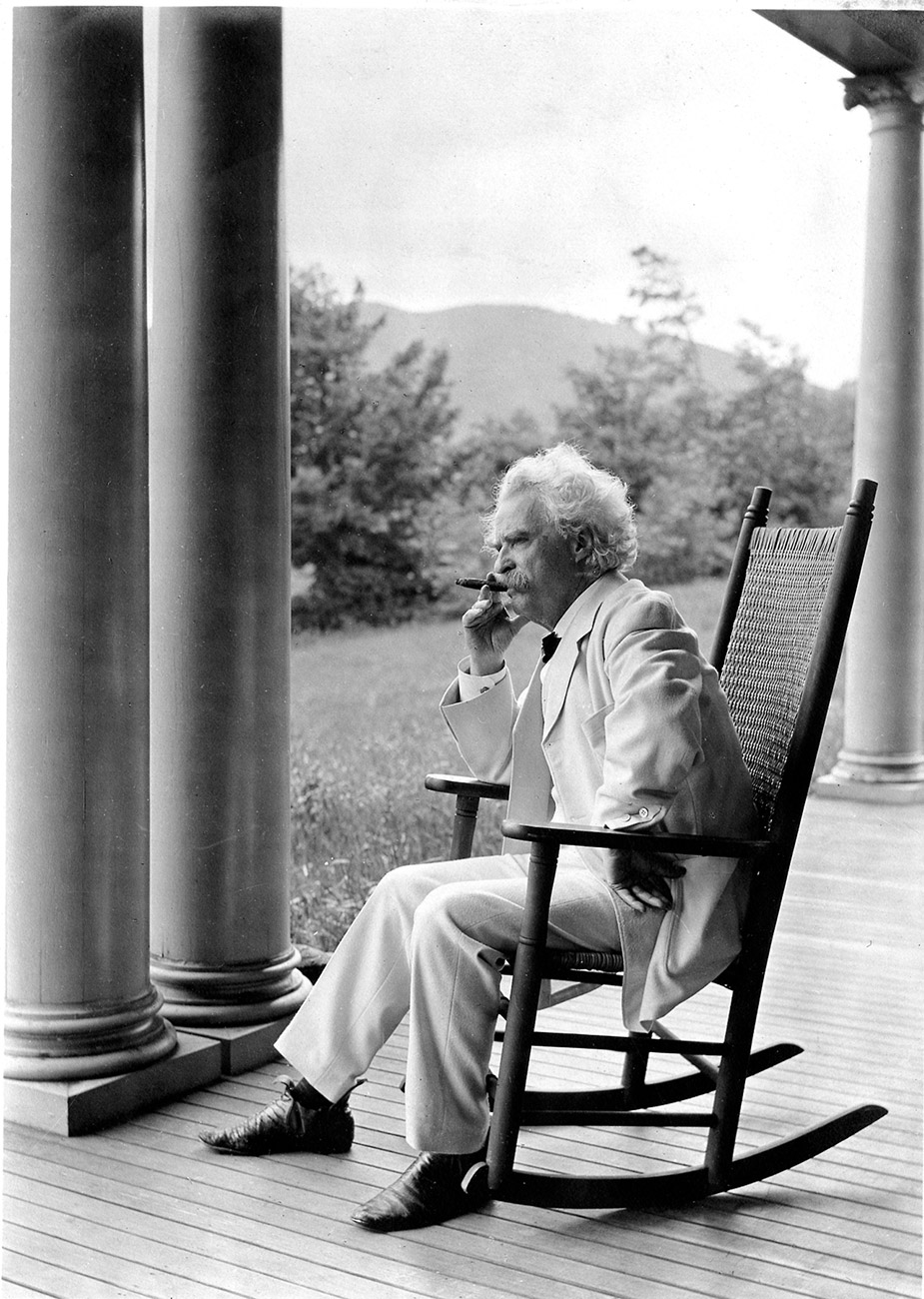
Grant had time on his hands—he truly had no real work to do at the brokerage firm. The editor of Century magazine offered to pay Grant $500 per article if he would write his recollections from the Civil War. Again, he said no. He was not a writer and certainly didn’t need the money. His life of leisure seemed a fitting reward for all he had done. So he visited friends, puffed his ever-present cigar, filling many a room with haze, and put on weight, topping 200 pounds—noticeably robust for someone five feet and eight inches tall.
A rare request from Ferdinand Ward interrupted Grant’s semi-retirement one day. The business faced a temporary cash shortfall of $150,000. Might Grant help? Perhaps invigorated by the chance to actually do some work for the firm, Grant rode his carriage to the home of William Vanderbilt, his friend and heir to the railroad and shipping fortune of Cornelius Vanderbilt, and got the money in no time. “I care very little about Grant & Ward,” said Vanderbilt. “But to accommodate you personally, I will draw my check for the amount you ask.”
Grant took the check home and gave it to Ward, who deposited it immediately into his personal bank account. Not 48 hours later, Grant arrived at 2 Wall Street to a sight he could hardly believe. A mob was amassing. His firm had gone under, taking with it the life savings of an unknown number of victims—including Grant himself. The damage did not stop there. Across the street at the New York Stock Exchange, the market tumbled on the news. Ulysses went home and told Julia, then emptied his pockets of cash. He looked down at $81 on the table. She added $130 more. It was all they had.
Grant & Ward went bankrupt because its liabilities totaled $16.7 million on assets of $67,000. The ex-president had been kept in the dark as to the firm’s business operations. Ward had borrowed money at outrageous interest rates, pledging firm securities as collateral—a practice known as rehypothecation, which was and remains a legal practice. But he would pledge the same security—say a U.S. government bond—over and over again to different lenders. That part was and remains illegal. He also paid off older investors with money from new ones. It would be another four decades before this scheme earned a permanent name, when Charles Ponzi did the same thing with so much publicity that he became eponymous with the technique.
The Grants were wiped out. The ex-president insisted on signing over his house to settle his $150,000 debt to Vanderbilt, who refused to take it. Instead, they reached a compromise whereby Grant would hand over his war medals—indeed, every memento of value—to the Smithsonian Institution. The Grants could remain in their house.
Desperate now for income, Grant contacted the editors at Century, who were still interested in his Civil War recollections. He agreed to write four articles, beginning with his personal account of the Battle of Shiloh, for $500 each. The magazine project turned into a book project, with Grant agreeing to a 10 percent royalty.
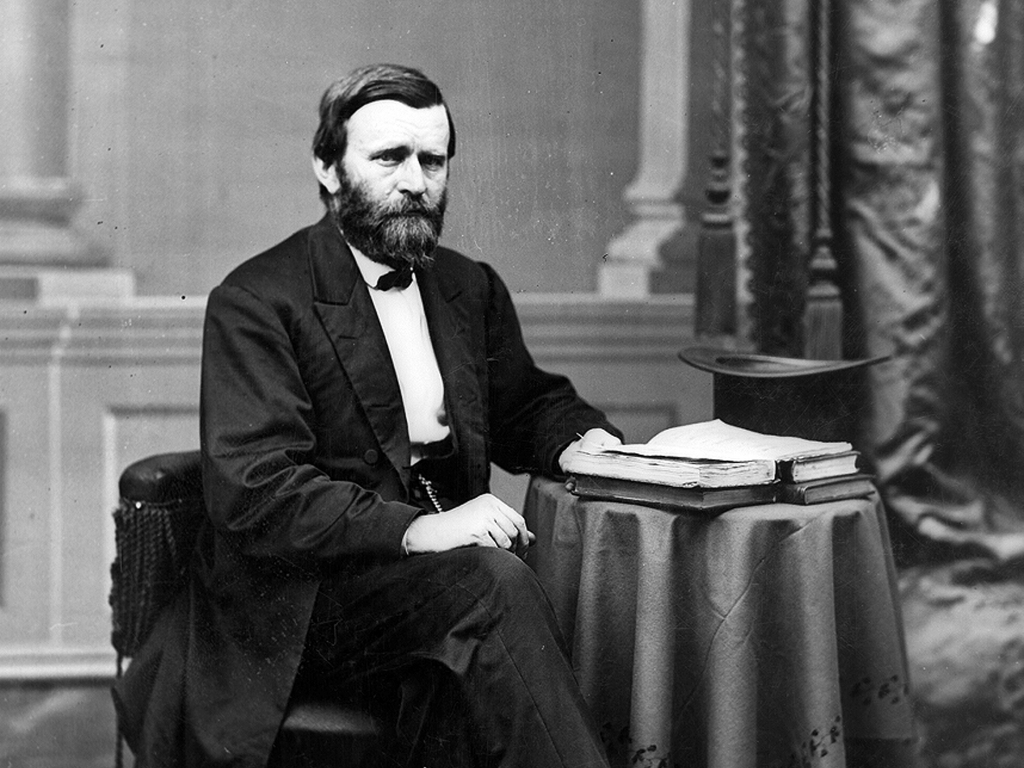
Grant was elated. His friend Mark Twain was amazed, but for a very different reason. He thought the magazine was ripping off Grant. A 10 percent royalty, said Twain, is what “they would have offered to any unknown Comanche Indian.” Twain offered to pay Grant 70 percent of book proceeds if he would sign with Webster & Company, Twain’s publishing company. Although Grant had not yet signed a book contract with Century, he felt obliged to honor his as-yet verbal agreement with Century. Twain talked him out of it.
As Grant settled into his writing routine, the words flowed more easily than he expected. But his throat bothered him. Some months earlier, while on a trip to a summer cottage, he had cried out in pain after biting a peach. A doctor found nothing amiss, but the pain not only refused to go away but grew worse. By October, his throat nagged him so much he went to see Dr. John H. Douglas, a specialist in New York. The doctor exuded admiration for Grant, then made a thorough examination and did not like what he saw. Grant may have noticed the concerned expression on his face. “Is it cancer?” asked the general. Probably, answered the doctor. A biopsy confirmed the diagnosis.
Alcohol may have damaged his reputation, but the cigars, it appears, took down Grant’s body with a ferocity he hadn’t experienced since the war. Grant’s throat cells were multiplying aggressively, starving normal cells for nutrients, laying siege. Grant could not win this civil war, one of the most intimate kind. Cancer was all but untreatable in those days. But the general could still battle. “This man fights,” Lincoln had once said of Grant. And so he did now.
Grant put every ounce of strength into writing, determined to leave his wife and family with a source of income when he was gone. He wrote diligently for four hours each morning. In the afternoon, one of his children would read it back or help check his facts. He insisted on getting everything right.
Twain visited whenever he could to read Grant’s drafts and offer encouragement and genuine praise. He remarked that only one writer in a hundred could write copy as clean as Grant’s. Twain was then reading Julius Caesar’s Commentaries and said, “The same high merits distinguished both books—clarity of statement, directness, simplicity, unpretentiousness, manifest truthfulness, fairness and justice toward friend and foe alike, soldierly candor and frankness, and soldierly avoidance of flowery speech.”
Not only could this man fight, he could write, too. He drew upon his keen memory for detail that had served him so well in war in accounts such as that of the lead up to the Battle of Petersburg:
“One of the most anxious periods of my experience during the rebellion was the last few weeks before Petersburg. I felt that the situation of the Confederate army was such that they would try to make an escape at the earliest practicable moment, and I was afraid, every morning, that I would awake from my sleep to hear that Lee had gone.”
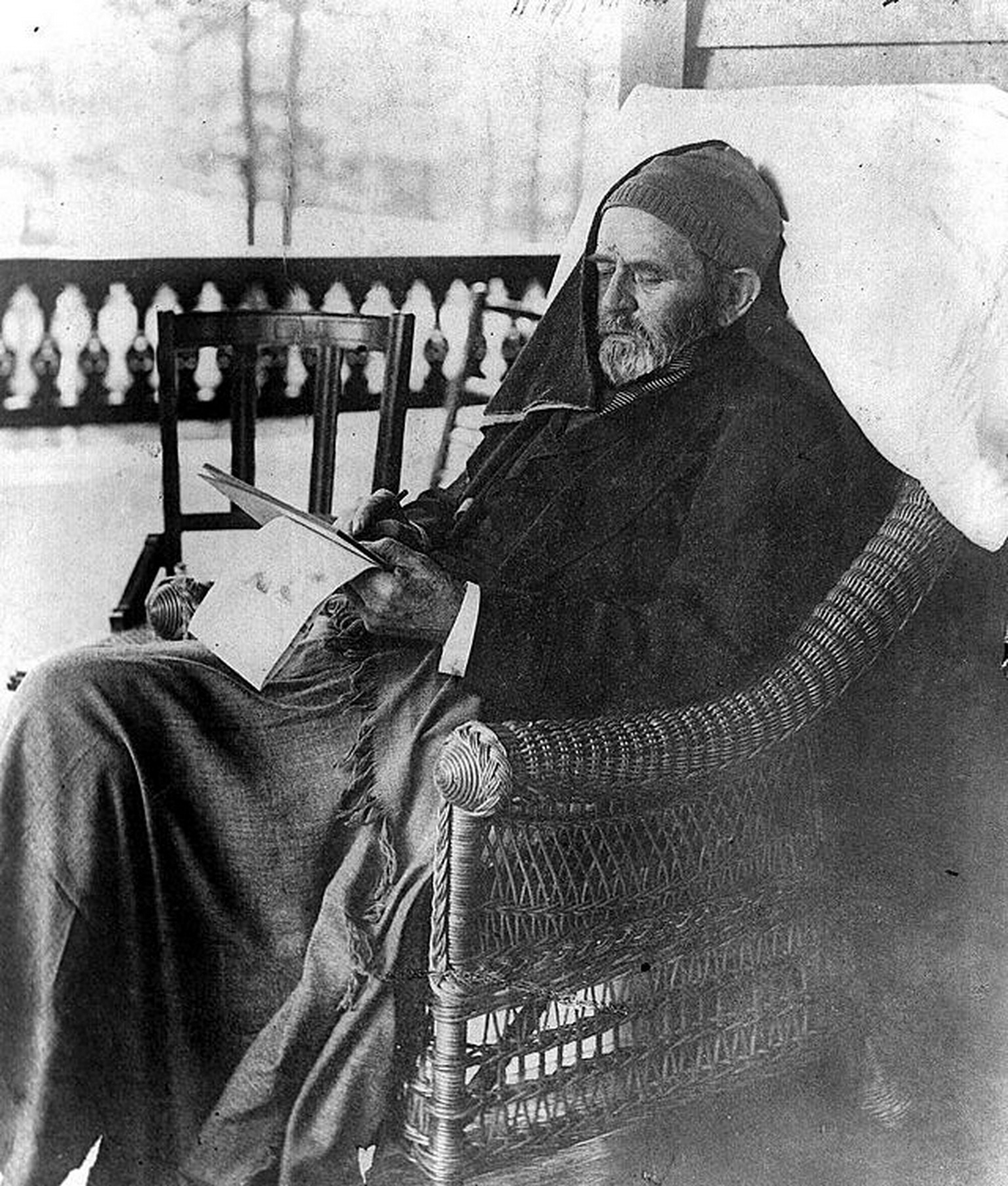
The work was agonizing, as was the pain, especially from swallowing. When Grant could not sleep, his doctor applied muriate of cocaine to his throat, which brought instant relief. The doctor would turn Grant’s pillow to the cool side and instruct him to turn on his side and bring up his knees, sleeping as a child does.
Grant’s weight dropped from over 200 pounds to 130—what he weighed as a young army commander. Back then, it was a sign of fitness. Now, emaciation. He chilled easily despite a shawl and knit cap. Twice a day, he went to see his doctor, by streetcar in order to save cab fare. He took morphine for the relentless pain. When that stopped working, his doctor gave him shots of brandy—by hypodermic needle.
When not writing his memoirs, Grant found time for correspondence, including a farewell letter to his wife. “There are some matters about which I would like to talk but about which I cannot. The subject would be too painful,” he wrote on a sheet of paper hidden in a coat pocket, to be found after his death. “I bid you a final farewell until we meet in another, and I trust better world.”
Grant structured his memoirs into two volumes. The first he wrote entirely in longhand, in pencil, on blue-lined, yellow paper. As he began the second, he had weakened such that writing by hand took too much energy. At Twain’s suggestion, he hired a stenographer, Noble E. Dawson, the general’s former secretary then working for the U.S. Senate, who came up from Washington, D.C.
Dawson would later describe the experience:
“General Grant dictated very freely and easily. He made very few changes and never hemmed and hawed… As he went on his voice became weaker and weaker, and toward the last, I had to take my seat very close to his, and he whispered his words in my ear while I took them down in shorthand. His last dictation was on the 22nd of June, 1885… After this he would sit with his pad on his knee near me, and would write down his ideas and sometimes doodle. He was very weak, and his hand grew more and more trembling as he neared his death.”
In July 1885, Dawson told Grant’s son Fred that the writing was practically finished. Grant had written and edited the first volume and written the second, which others could edit. “I think we had better tell your father that the book is done,” Dawson advised.
Grant could hardly believe it. He asked that the entire work be read aloud. His children took turns obliging, but he was only strong enough to hear the first volume, by then too weak even to listen. He died a little past eight o’clock in the morning of 23 July 1885.
Grant had written 275,000 words in less than a year—roughly three times the length of a typical novel, which an author might take several years to write. He lived just long enough to feel the relief any writer feels when completing a manuscript, but died before his memoirs were published. Grant would never know if his last venture to provide for his family would be a financial success or yet another failure.

On 08 August 1885, Grant’s funeral procession began with the ringing of the bells of Trinity Church, directly across the street from 2 Wall Street. At that instant, a Western Union telegraph operator sent a signal to waiting receivers in towns across the U.S. and into Mexico so that all across North America, bells would ring 63 times, Grant’s age, at 30-second intervals.
The line of mourners marching slowly behind the casket stretched more than seven miles. Julia was too wrought with grief to be among them. In the four-person carriage at the head of the cortège rode Union generals William Tecumseh Sherman and Philip Sheridan, knee-to-knee with Confederate generals Joe Johnston and Simon Bolivar Buckner. It was a reunion once unthinkable. Now, former mortal rivals sat together, such was the universal admiration for Grant.
Four months later, the first printing of The Personal Memoirs of Ulysses S. Grant went on sale. Twain had orchestrated a clever subscription campaign so readers might pre-order one of three different bindings, each at a different price point, to maximize revenue. He suspected an adoring and grieving public was eager both to read Grant’s words and to help his wife. He was right.
Twain presented Julia Grant with a check for $200,000. It was then the largest royalty payment ever made and would be followed by more. In the end, she would receive roughly $450,000, or nearly $12 million in today’s dollars. Julia would pine the rest of her days for her beloved Ulys, but not for money. Ulysses S. Grant proved, at last, he could make money as a civilian, as a writer. His book remains in print to this day.
© 2017 All Rights Reserved. Do not distribute or repurpose this work without written permission from the copyright holder(s).
Printed from https://www.damninteresting.com/the-reconstruction-of-ulysses-s-grant/
Since you enjoyed our work enough to print it out, and read it clear to the end, would you consider donating a few dollars at https://www.damninteresting.com/donate ?
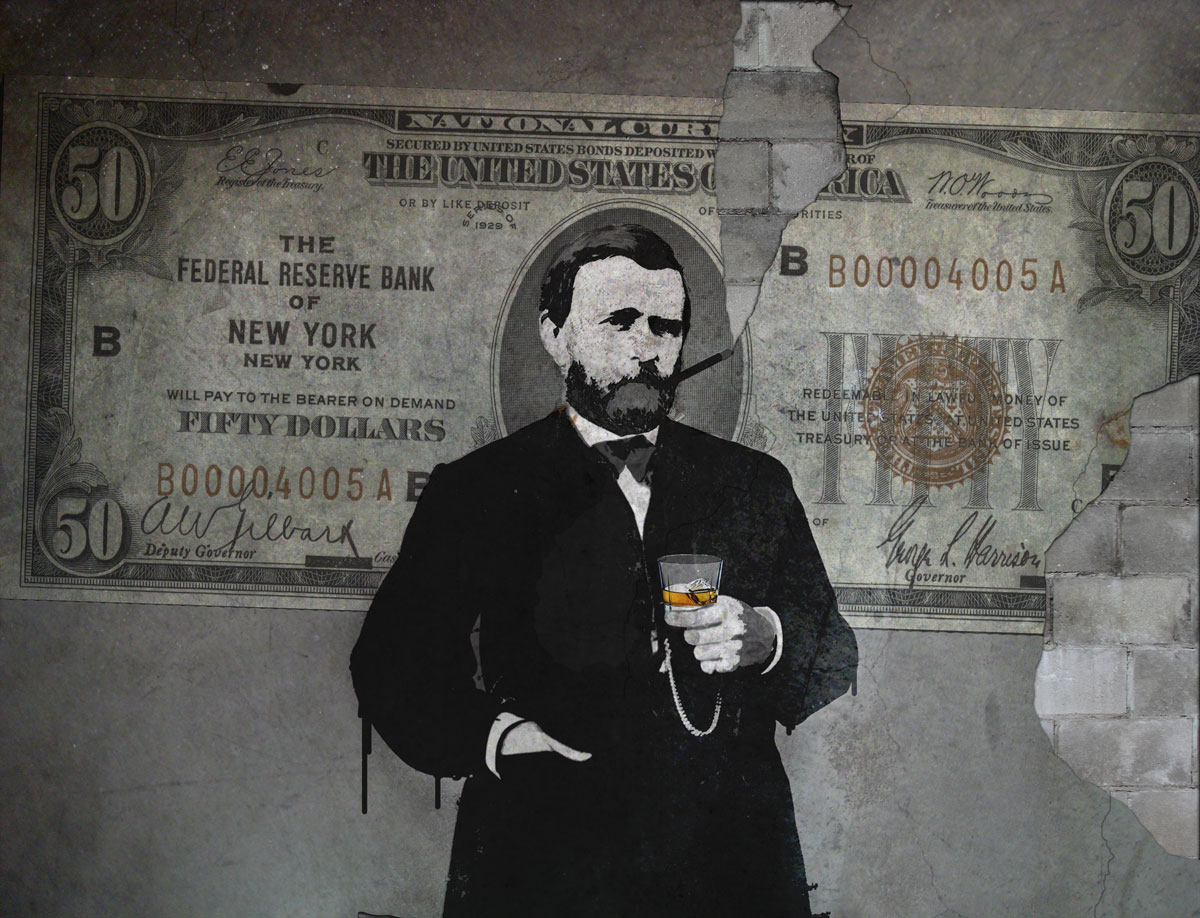
Regarding the sentence, “They liked Grant, who let it be known his opposition to his boss”:
I believe that the expression “let it be known” should be followed by “that”, which would require the sentence read, “They liked Grant, who let it be known that he was opposed to his boss”.
Alternatively, one could drop the word “it”, and the sentence would read, “They liked Grant, who let be known his opposition to his boss”.
First
I disagree. “They liked Grant, who let it be known his opposition to his boss” is grammatically correct — there’s no need to rewrite the sentence.
Great job, again! I never thought I would say I want to read Grant’s memoirs, but after this I do. As always, your articles leave me wanting to know more. Thank you!
As for the sentence being discussed in the comments above, it works either way, including the way it was written in the article. I don’t think it’s worth arguing about. Just enjoy reading an article that’s really damn interesting! ;)
grendel25, I disagree with your disagreement, and here is why.
The clause “his opposition to his boss” is a *subject* clause. You can tell that it is a subject, because it doesn’t contain a verb. (Subject clauses can also contain verbs, but if they don’t, then you know that they are definitely subject clauses.) Being a subject clause, it cannot be used as the object of the phrase “who let it be known [that]”. So the sentence is nowhere near grammatically correct as (originally) written, and indeed demonstrates a complete misunderstanding of the difference between a subject and an object.
To fix it, the phrase “who let it be known [that]” needs to be followed by an *object* clause, describing something that can be known. This clause would look like a complete sentence on its own, and in particular needs a verb. For example, you could let it be known that you don’t know the difference between a subject and an object. *That* clause includes the verb “know”, and can therefore stand as a sentence on its own. Hence it makes a perfectly good object clause.
As richs says, if you were to instead remove the existing subject “it” from “who let it be known”, then you could use “his opposition to his boss” as the subject of that phrase. Otherwise the sentence has two subjects, referring to the same thing, with no conjunctive glue of any sort, making a complete hash of the grammar. It is no more correct than “The cat it ate some food.” Try getting that past your second grade teacher.
Hope that helps! It looks like the offending sentence has already been rewritten anyway.
(And Daisy, it’s always worth arguing about, arguing is fun too!)
I don’t care over much for the grammatical debate, but I would like to say that I found this to be a brilliantly written article about a man I knew little about. I found him to be a fascinating man and this story will remain with me for many years. Geoff Smith, England, April 2017.
In the 1980s, I bought both Grant’s memoirs and Sherman’s. Grant’s book was incredible–he was a brilliant writer–and well worth reading. I couldn’t make it far into Sherman’s book; putting it kindly, his writing style was not the best, as I remember.
Mr. Smith:
You wrote exactly what I intended to write myself.
Anything else from me would be painting the lily.
By the way, my family comes from England, and a small village in North Yorkshire bears my surname.
May I ask in which part of England you live?
The funeral photo is wrong. It’s dated 4/26/12 and shows the funeral of Grant’s son. The Library of Congress has the details http://www.loc.gov/pictures/item/ggb2004010388/
@Mike B: Oops! Thanks for pointing out the erroneous photo. We’ve replaced it with a photo of Grant’s tomb.
TheoLib:
I live in General Sherman’s birthplace: Lancaster, Ohio. I learned quite some years ago not to tell anyone in the South where I was from, unless I prefaced it with the fact that I was born in Kentucky.
Mr. Durbin’s article also mentions General Sheridan. By coincidence, General Sheridan grew up about 20 miles southeast of Lancaster in a little town call Somerset.
William S. McFeely wrote an excellent 1981 biography of Grant.
As a general, Grant was so averse to retreating that whenever he returned to a previous point he’d take a different route back!
Excellent article. I love reading stuff like this. There is so much history that I missed as a teenager because I wasn’t interested. I means so much more to me now. Thanks again Michael.
This article continues to present the misnomer that grant was an alcoholic. It also fails to present the conditions that led up to the one point in Grants life when he drank to much which resulted in his early retirement. Grant and his troops were being deployed to the west coast by way of panama before the canal. They were allowed to take there families but grants left his behind because his wife was pregnant and he knew the perils of the Panama crossing. A great number of his men and there families got sick with malaria during the crossing. Grant acquired a ship to serve has a hospital and helped tend his men and there families, many whom died. Struggling with little to do when finally reaching the west coast, being away from his family, the horrors of the crossing and a senior officer who was not fond of grant he turned to alcohol for one time in his life, got in trouble and was drummed out of the army. The rumor of his alcohol issue was spread by his detractors but according to his army secretary in the war, doctor and those who were with him for much of his life following the incident claim they never witnessed him over imbibe or drink in excess. It is a slander that has stuck which him but if you look deeper into the accounts of those who were close to grant for most of his life and career after the west coast stint they all claim to never have seen him abuse alcohol.
Check out “the civil war 1861-1865 a history podcast” for more detailed info and numerous sources.
A phrase in apposition only needs a comma…
Who let it be known, his opposition to his boss.
What a great article about a man I hardly knew anything about. It’s made my day! Thanks guys! I feel terrible about the tragic points in his life, but he was very uncommon about driving forward to remedy them.
Mick Lang, London
Great article. I had never heard that Grant and his wife were invitees that fateful evening…
Thank you!
A great chronicle of a great man. Thank you, DI!
Love it!
An interesting note is Ferdinand & Ward’s scheme to augment NYC’s drinking water supply by piping water across the Hudson River from the Ramapo River. The profit from that scheme would have been a 50% net profit.
There was much to admire about Grant, but his administration has been compared to that of Harding’s. The level of corruption is almost unmatched. What are your views on that?
May I point out that unlike your more educated commentators I have no opinion of the grammar etc of this article. I would point out however, the content was fascinating and the writing style, in my humble opinion, excellent. Put it this way I thoroughly enjoyed it and learned a lot. That works for me. Thank you.
I read this article after just having finished Ron Chernow’s biography of Mr. Grant named Grant. For all of you grammar bloodhounds, I would have underlined the title except that this little comment program wouldn’t let me. You are welcome to pull me apart on anything else.
I highly recommend that book. I fell in love with Grant, the book and the man. Chernow covers the drinking in a comprehensive way. The letters, quotes, and anecdotes that he provides give a nuanced analysis of a sticky issue in Grant’s life. His military aide and self-appointed personal protector John Rawlins’ descriptions of his boss to others, and his uber-vigilance of him during the war are particularly telling. Anyway, read the book. You’re gonna love it! I guarantee it!
It’s been a few years since I’ve stopped to read your articles, I miss them, must try to catch up.
Just checking back in to see who else has checked in since 2017.
After reading this article I feel that Grant was a great man who really cared for his wife because despite the pain and weakness from the disease he kept on writing so that his wife would not have to go through the hardship after he was gone.
He wasnt that steadfast an antislaver.
‘ A letter from Grant to his sister, Mary, in 1859 describes “I now have three negro men, two hired by the year and one of Mr. Dents, which, with my own help, I think, will enable me to do my farming pretty well’
> A letter from Grant to his sister, Mary, in 1859
ChatGPT reports:
> Ulysses S. Grant … freed his slave, William Jones, in March 1859. …
So either the letter was written within the first three months of 1859, or the freed man was kept on under wage terms other than hiring “by the year” like the others.
p.s. Dents was the maiden name of Grant’s wife — which the freed slave may have felt reason to want to change to “Jones”.